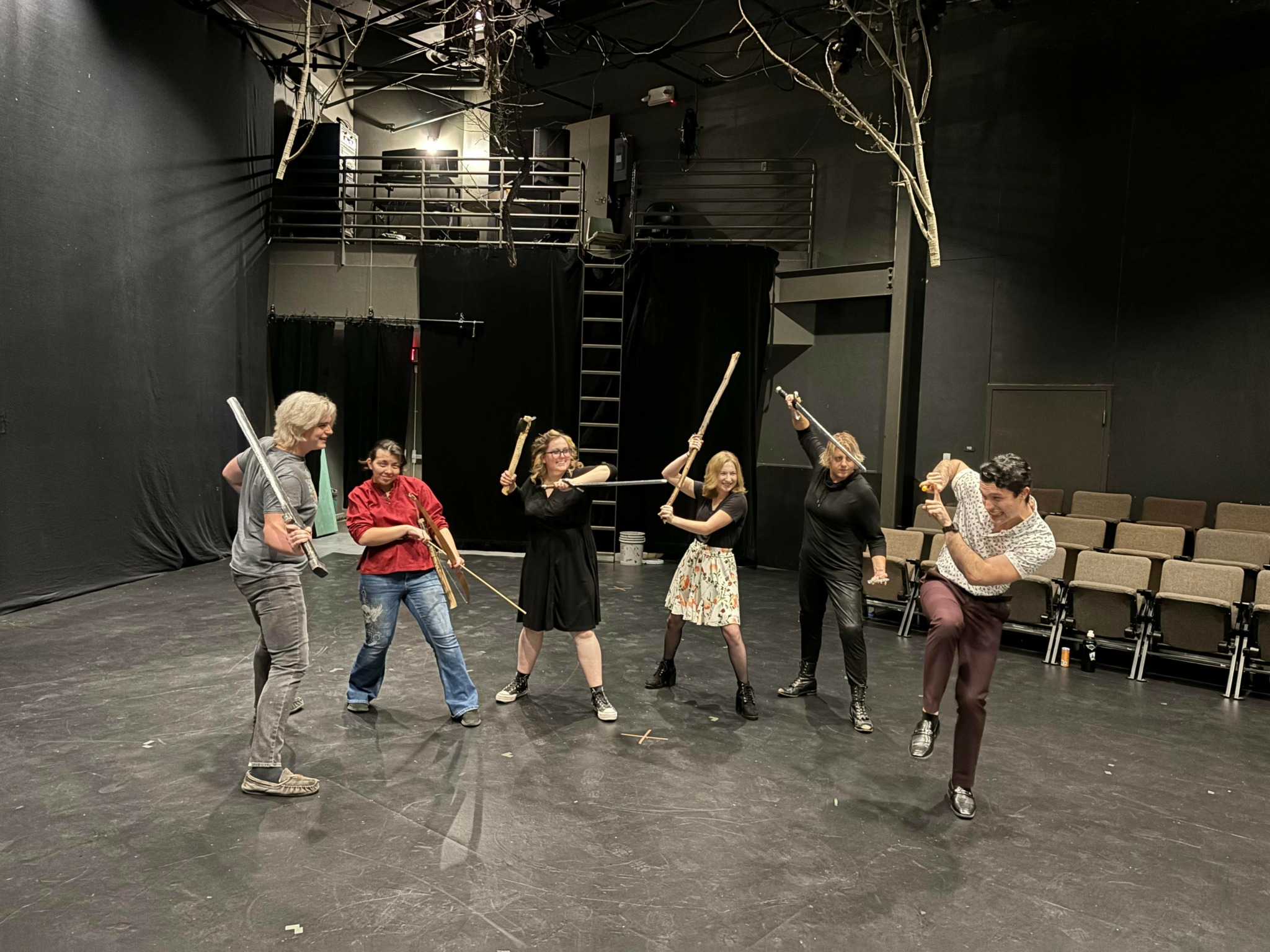We caught up with the brilliant and insightful Nicholas Holguin a few weeks ago and have shared our conversation below.
Nicholas, thanks for taking the time to share your stories with us today So, let’s start with a hypothetical – what would you change about the educational system?
When I started my undergraduate degree at New Mexico State University (NMSU), I never pictured myself performing an a stage to do theatre. I was certain that I would find my time in undergrad to be a breeze and graduate in a quick three-and-a-half years. Life, as we all know, doesn’t function that way, and I stumbled into an acting class; that accidental addition to my schedule changed the course of my life.
I believe that the arts add an incredible amount of curiosity and inquisitiveness to the world we live in; in a way, artists are scientists that are exerting themselves arduously to uncover truth. Truth can be relative, and as we each have (unarguably) distinct and unique points of view, how we experience life adds to the honesty/truth of our art.
I wish more students at universities across our country would open themselves up to taking some introductory art courses; I know that many institutions require an arts/humanities credit that is typically satiated by an “Intro to Art/Theatre/ Music History course; however, if they asked their students to go a step further into the creative side of these disciplines, we might garner a far deeper/different appreciation for these artistic mediums.
After graduating from NMSU, I spent some time working for the public schools in Las Cruces, NM; I found that utilizing my theatre background helped me connect with the students in language arts–what a shocker, I know–as well as science courses. The idea is not to make education more entertaining for public school students, although that doesn’t hurt, but by broadening my artistic faculties, I was able to connect more with students I was hired to assist/educate. My performance background helped me land additional jobs at gyms & in sales, as well; this wasn’t due to me being a good with sales but with my willingness to learn and be personable. Granted, this is not a guaranteed outcome for any training program within the arts, but I developed this openness from performing and learning about/from others.
With the current students I teach, I encourage them to branch out and learn more about others aspects of theatre/arts/life. Learning more about a plethora of subjects, even just introductory amounts of it, can help broaden your perspective of it. Not to mention, if you’re ever auditioning for a role that deals with that subject matter, you have an advantage over most people thanks to that curiosity of yours. This is why I’m thankful that at NMSU & at Adams State University (where I work), the degrees offered are Bachelor of Arts (B.A.) and not Bachelor of Fine Arts (B.F.A.); the tools gained by studying the various facets of theatre introduce a foundational, dynamic toolkit and skill-set for our students to be built upon. I truly believe programs offering B.F.A. degrees are doing an incredible disservice to their students. The holistic theatre artist (in my hope) has an appreciation of all theatrical/performance components that make a production possible. My hope is also that the well-rounded student, with an additional introductory artistic (practice) course, will help further the societal view of art not being a luxury but a necessity for our daily lives. We turn to artists, daily, for emotional/mental sustenance when we watch shows/movies, read books, buy furniture/appliances, listen to the radio/music, identify or associate a brand due to their logo–the artist’s impact is felt everywhere; so let us further appreciate and acknowledge their contributions by encouraging students to take courses to create their own art.
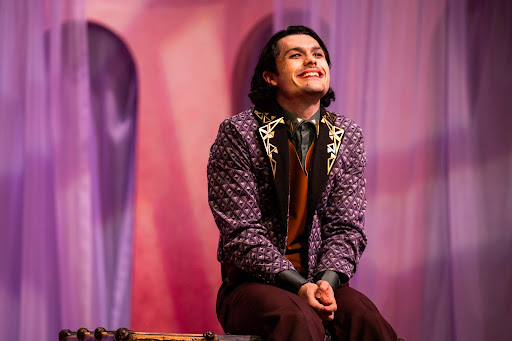
As always, we appreciate you sharing your insights and we’ve got a few more questions for you, but before we get to all of that can you take a minute to introduce yourself and give our readers some of your back background and context?
Well, I got into acting by (serendipitous) accident: I was studying to be a journalist at New Mexico State University (NMSU) and I was a bit overzealous with my course-load one semester. I ended up dropping a class but needed to replace it with something in order to maintain my scholarship (which had a minimum credit threshold). The first elective that popped up was Acting for non-Theatre majors, and I was hesitant to give it a go, but I was incredibly curious since I had a handful of friends that were acting in the plays produced by the department. I gave it a shot and it changed the trajectory of my life. I was in a class full of creative people from all across campus, all learning about what it meant to act and how to think about scene-work. To this day, the professor that taught that class, Associate Professor of Theatre Larissa Lury, is a mentor of mine. I can easily say that I would not have had the curiosity nor courage to venture forth and explore the world of theatre without her advice and mentorship.
Whenever I think back to that class, I remember how entirely wrong and ignorant I was of what an actor had to be and/or do. That continued for years as I took on more acting and performance classes: I really held so many incorrect assumptions about art and acting. The best way that I learn has been by doing things–I’m a kinesthetic learner, through and through. I’ve ben to acting classes/workshops with non-theatre people, and I’ve seen how valuable it is to actors and non-actors alike. I don’t say this to separate or gatekeep actors from others; I simply say this because many people I’ve come across don’t consider themselves actors and yet have learned a great deal from these courses/workshops to apply in their fields of work.
I’ve said it before and I’ll say it again: I think everyone should take an acting class. Or a painting/sculpting/graphic design/woodwork/guitar/piano/singing class. Broaden your horizon. Introduce yourself to more art, and allow yourself to be an artist without needing the status or external validation. Do it for the sake of trying it out; give yourself a try and see what you can create.
My teaching philosophy now is to help as many students give these creative endeavors a try; it’s only by experiencing these things for themselves that they can see the value (and necessity) of that artistry, as well as the time dedicated to deepening and refining their unique artistic language of expression.
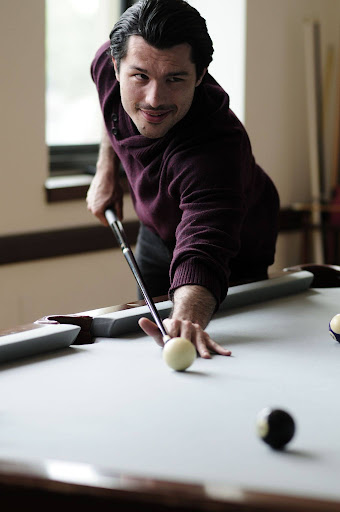
What’s the most rewarding aspect of being a creative in your experience?
The most rewarding aspect of being a theatre educator and artist is introducing others to the infinite number of worlds they can create for themselves (and together). I tell my students, time and again, that there is no “correct” way to make their art. If they are putting the time in to researching the world of the play where the characters exist, getting to know their scripts with a sort of fixated zeal, and entering each rehearsal room/space with curiosity and an openness to listen/react to what their collaborators bring, the potential that awaits them is truly illimitable. Thinking about how strong a choice is and getting caught up in a blueprint for your character’s required journey will limit you from being present when you perform. I’ve seen actors go on auto-pilot, and I’ve been that actor myself (when I’m not careful), and where is the artistry in that? Where is the risk? Where is the moment-to-moment listening that one of my favorite acting instructors, Professor David Barker, would grill us on? When we focus too much on what we think a moment needs to be, we seal ourselves off from our scene partners (and audience) and make the moment about ourselves. Listening, active listening, requires the risk of not knowing what comes next, because that’s how conversations exist! We cannot reach the rewarding parts of acting/performance without risking looking like fools/clowns. Granted, you don’t want to be the actor that goes up on their line, ever, but it happens most to me when I’m not in the moment and I’m trying to think ahead, or think about whether I see someone I know in the audience. Our greatest reward when performing is sharing a genuine experience with an audience that cannot be recreated with precision on a nightly basis, and we shouldn’t strive for that. When we strive to allow each rehearsal/performance have its own life and truth, and we are dialed in to what our scene partners are saying, and we don’t ride the wave of, “Was that line delivery funny enough? Was that gasp dramatic enough? Was my disgust palpable?” and we continue forward, without obligation or preconceived notions, we begin to tap into the reward of living in the moment, as our character(s). When that happens, and we aren’t focused on what we feel but on what the truth of each line is, and those change with the life of every night; when we aren’t focused on ourselves, we share experiences of truth and honesty. We allow room for ourselves to change and be changed. And when it comes to performing, when we feel that change in our scene partners, the audience, and even ourselves, that reward (to me) is priceless.
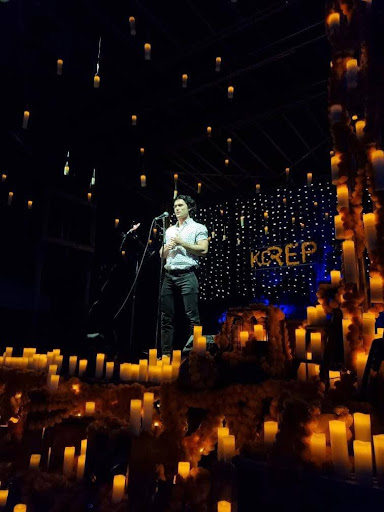
Is there something you think non-creatives will struggle to understand about your journey as a creative? Maybe you can provide some insight – you never know who might benefit from the enlightenment.
As an actor, we shouldn’t be focused on how we say something in order for it to be _____, if that makes sense? When we focus on what it is we want, why we want it, what we’re willing to do to get it, and what’s in our way, you find the inspiration to say what you need. More often than not, when we get hung up on how to say a line, we are disconnected from our objective(s). I like to phrase it this way: when you were a kid, how many of us would ask our parents/guardians for the exact thing we wanted in the exact moment we wanted it? Odds are that you went bout asking for that gift/present/thing in a planned out way, perhaps in a way that you had schemed out as “bullet-proof,” no? You made sure to compliment your mom/guardian’s hair, or their dress/shirt/suit/tie/etc.; you might have been extra zealous in helping out with chores that day or making sure you were on your most respectful and mindful behavior that day. You butter them up before asking for what it is that you want, the real reason you’ve been comporting yourself in the manner you did–I definitely did this a number of times, and not out of ornery or manipulative tendencies, but I wanted to give my parents every reason to be on my side when I asked for the thing. Most of the time they would say no, which led me to double-down and try to do even more things. Now, when a character wants something in a play, you need to ask yourself why they want it and what they’d be willing to do to get it. If it isn’t stated for you, this is the ultimate freedom! You can make the artistic choice of providing your own reason, and make it a strong one! A specific reason that yo can pinpoint can be your north star, and even influence the way in which you interpret the rest of the script. Justify EVERYTHING so that no part of your character’s make up is alien to you. Make them as specific as possible. Specificity in your choices is crucial to sharing a character on the stage. Unless your director asks for a more generic moment, which in my experience is incredibly rare yet possible, do your utmost to be as specific as possible. The things that motivate your character and any bits of history provided in the text are your allies in creating a real person on stage with a full life. Even when you have a small role with very limited dialogue, have a specific point of view! Don’t just be a valet, be a valet with an opinion! The valet in the script doesn’t have a name, so give them one; give them as many details as you can so that every moment you have on stage is true to your character, rather than a caricature of a character.

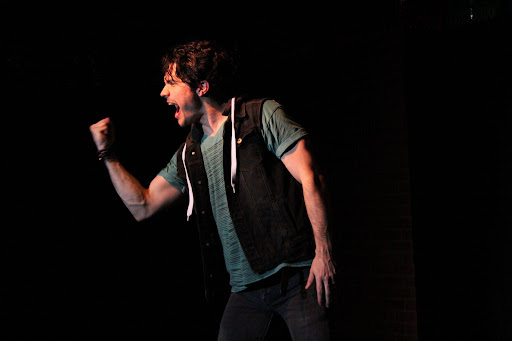
Image Credits
Roman Soldiers Fighting – Julius Caesar (Heart of America Shakespeare Festival): photo by Dean Davison
Me Sitting on trunk with purple jacket & fuchsia/violet backdrop – photos by Brandon Parigo
Me playing pool: photo by Jeff Nicholson


